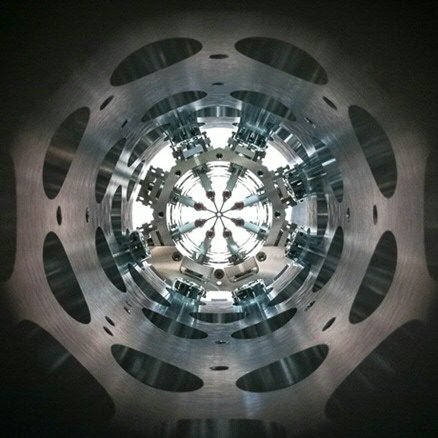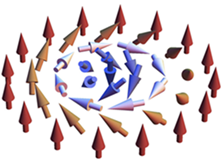€ 15.1 million for promising physics research
The Foundation for Fundamental Research on Matter (FOM) has awarded a total of € 15.1 million to 7 research programmes. The research topics span the field of physics: from black holes to cold molecules. Researchers from the University of Groningen are playing a prominent role in 3 of the 7 programmes.
Physics beyond the standard model with cold molecules (€ 2.69 million)

The leader of this programme Prof. Steven Hoekstra wants to help answer some of the main questions in particle physics and cosmology by improving measurement of the eEDM (electric dipole moment of electrons) in a sensitive new experiment using cold molecules. In this programme, the University of Groningen is working closely with VU University Amsterdam and Nikhef. The researchers will carry out the actual experiment jointly in Groningen.
Hoekstra was delighted: ‘It’s fantastic that we’re being given the chance to carry out this exciting experiment, which combines atomic, molecular and particle physics. We will use our expertise in cooling and decelerating molecules to measure the size of the eEDM. It’s fascinating to think that we can use this new approach in a compact experiment to reach the boundaries of the standard model of particle physics.’
Exploring new horizons; space-time, black holes and quantum information (€ 2.66 million)
New and unexpected parallels between gravity and quantum information theory mean that space-time and gravity do not exist in isolation, but evolve from the combined behaviour of specific quantum degrees of freedom. In this programme Prof. Eric Bergshoeff (Van Swinderen Institute) and colleagues from Amsterdam (UvA), Leiden and Utrecht want to discover the general principles and mathematical laws governing quantum gravity, and their implications for the physics of black holes and cosmology. The consortium will focus on string theory, as well as using new concepts from both quantum information theory and solid-state physics
Programme leader Eric Bergshoeff: ‘Quantum information theory is giving new impetus to the fascinating research into quantum gravity. The ensuing emergent gravity has changed our perception of space, time and forces for good, and this could have far-reaching consequences for our understanding of black holes and cosmology.'
Skyrmions as information carriers (€ 1.63 million)

In this research programme Prof. Maxim Mostovoy (Zernike Institute for Advanced Materials) joins colleagues from Delft to examine magnetic skyrmions. A skyrmion is a complex magnetic, vertebra-like structure, which could best be described as a round object in which the direction of the magnetic moment on the outer edge is the opposite of that in the centre. Skyrmions play a role in all kinds of physical contexts.
‘We are delighted with this funding, which will enable us to realize and apply skyrmions in new materials’, was programme leader Mostovoy’s reaction on hearing the news.
More information
Website of the Foundation for Fundamental Research on Matter
| Last modified: | 22 July 2021 09.45 a.m. |
More news
-
03 April 2025
IMChip and MimeCure in top 10 of the national Academic Startup Competition
Prof. Tamalika Banerjee’s startup IMChip and Prof. Erik Frijlink and Dr. Luke van der Koog’s startup MimeCure have made it into the top 10 of the national Academic Startup Competition.
-
01 April 2025
NSC’s electoral reform plan may have unwanted consequences
The new voting system, proposed by minister Uitermark, could jeopardize the fundamental principle of proportional representation, says Davide Grossi, Professor of Collective Decision Making and Computation at the University of Groningen
-
01 April 2025
'Diversity leads to better science'
In addition to her biological research on ageing, Hannah Dugdale also studies disparities relating to diversity in science. Thanks to the latter, she is one of the two 2024 laureates of the Athena Award, an NWO prize for successful and inspiring...
